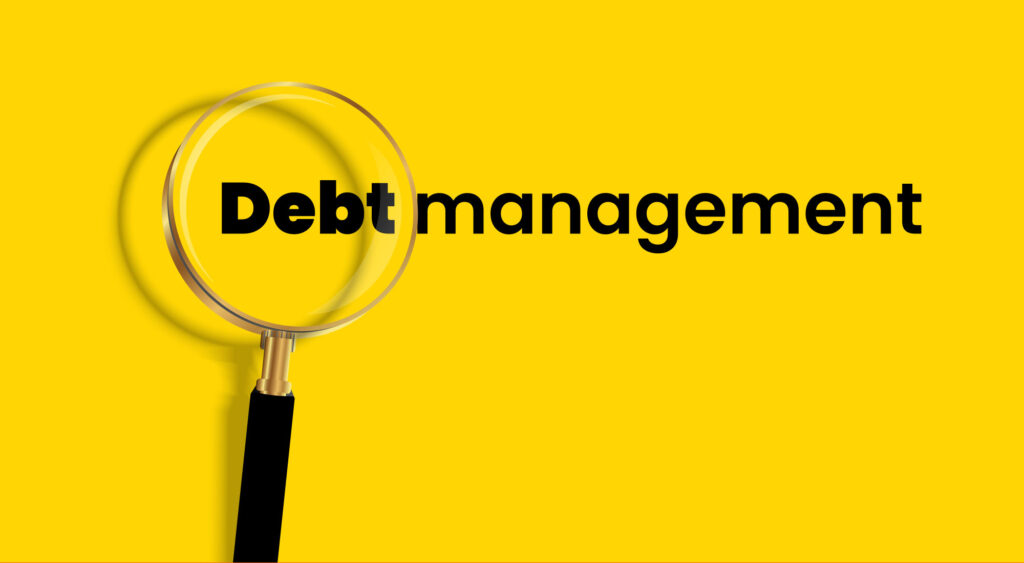Understanding The Debt Management Strategies:
Financial mastery demands more than just routine budgeting. It's about conquering the challenges posed by debts, paving the way for a secure and stable future. Let's first dive into this guide that unveils effective debt management strategies, empowering you to navigate financial troubles with confidence and build a solid foundation for lasting prosperity.

The financial terrain is vast and varied, with different types of debts holding unique challenges. From credit cards and student loans to mortgages and medical bills, each debt requires a specific approach. This guide begins by unraveling the intricacies of your debt portfolio, ensuring you comprehend the nuances of your financial landscape before crafting tailor-made solutions.
Creating A Solid Foundation:
Crafting a financial fortress starts with a detailed budget, providing a panoramic view of your income and expenses. This foundational step enables you to identify areas for improvement, allowing you to allocate resources strategically and prioritize debt repayment. A strong foundation is the bedrock of effective debt management.
Strategic Debt Repayment:
Armed with a comprehensive budget, it's time to strategically attack your debts. Prioritize based on interest rates and outstanding balances choosing between the snowball and avalanche methods to suit your financial temperament and goals. The journey to financial freedom begins with smart calculated steps.
Snowball Method:
● Start small to build momentum.
● Eliminate smaller debts quickly for motivational boosts.
● Redirect freed-up funds towards larger debts.
Avalanche Method:
● Target debts with the highest interest rates first.
● Minimize overall interest costs.
● Maintain focus on high-priority debts until they are fully repaid.
Consolidation As A Powerful Tool:
Debt consolidation serves as a potent weapon, streamlining multiple debts into a more manageable payment. This approach simplifies your financial obligations potentially reducing interest rates and providing relief from juggling various due dates. While a powerful strategy, ensure consolidation aligns with your overall financial goals.
Budgeting and Expense Reduction:
Refining your budget is an ongoing process that requires vigilance and adaptability. Look for areas to cut non-essential spending, renegotiate fixed expenses, and redirect funds towards debt repayment. It's not just about saving money; it's about strategically reallocating resources for financial empowerment.
Cutting Non-Essential Spending:
● Eliminate discretionary expenses for accelerated debt repayment.
● Evaluate subscriptions and memberships for potential cost savings.
Negotiating Fixed Expenses:
● Contact service providers for lower rates on utilities, insurance etc.
● Explore refinancing options for high-interest loans.
Emergency Fund For Financial Resilience:
An often overlooked yet pivotal aspect of financial security is the creation of an emergency fund. This financial safety net acts as a shield against unforeseen expenses, providing a crucial buffer during challenging times. Strive to save three to six months' worth of living expenses in an easily accessible account, ensuring you have a robust foundation for weathering unexpected financial storms. Consider automating regular contributions to your emergency fund, making it a non-negotiable part of your financial strategy.
Financial Literacy and Education:
Knowledge is the key to unlocking financial empowerment. Dedicate time to enriching your financial literacy through a variety of resources. Attend workshops, seminars, and webinars conducted by financial experts. Explore reputable publications, both online and offline, to stay abreast of economic changes and financial trends. A well-informed approach to debt management not only strengthens your financial well-being but also positions you to make informed decisions about investments, savings, and future financial planning.
Professional Guidance and Debt Counseling:
In some instances, seeking professional advice is a prudent and strategic choice. Debt counselors and financial advisors bring specialized knowledge to the table, offering tailored strategies for your unique financial situation. Beyond negotiation with creditors, these professionals provide valuable insights into optimizing your debt management plan. Prioritize thorough research when selecting a financial advisor to ensure you partner with someone whose expertise aligns seamlessly with your financial goals.
Monitoring and Adjusting:
Financial landscapes are dynamic and subject to change. Vigilance is key to staying ahead. Regularly reassess your financial situation to identify emerging trends, challenges, and opportunities. Adjust your budget as needed, considering changes in income, expenses, and overall financial goals. Celebrate milestones achieved in your debt repayment journey, acknowledging the progress made and using it as motivation to tackle the next financial challenge. Cultivate flexibility in your financial strategies, adapting them to align with your evolving circumstances and aspirations.
Remember, a proactive and informed approach to financial management is the cornerstone of a resilient and prosperous financial future.
Exploring Debt Types In Detail:
Understanding the various types of debt is crucial in developing effective debt management strategies. Credit card debt, often notorious for high-interest rates, requires a different approach than student loans or mortgages. Begin by categorizing your debts and understanding the specifics of each. This nuanced understanding forms the foundation for crafting personalized solutions to tackle each debt type effectively.
Credit Card Debt:
Credit card debt can accumulate rapidly due to compounding interest rates. Begin by reviewing all your credit card statements to grasp the outstanding balances and interest rates associated with each card. Explore options such as balance transfers or negotiating for lower interest rates to alleviate the burden.
Student Loans:
Student loan debt often comes with varying interest rates and multiple repayment plans. Investigate the available repayment options, such as income-driven repayment plans or loan consolidation. Understanding the terms and conditions of your student loans is essential for creating a repayment strategy aligned with your financial goals.
Mortgages:
Mortgages are long-term commitments, and exploring refinancing options can be beneficial, especially when interest rates are favorable. Consider consulting with a mortgage advisor to understand if refinancing is a viable option to reduce monthly payments and overall interest costs.
Medical Bills:
Medical bills, often unexpected, can cause financial distress. Communicate with healthcare providers to negotiate payment plans or potential discounts. Some medical facilities offer financial assistance programs, so explore all available avenues to alleviate the burden of medical debt.

Advanced Strategies for Strategic Debt Repayment:
While the Snowball and Avalanche methods provide a solid foundation for debt repayment, consider advanced strategies to further optimize your approach.
Debt Laddering:
Debt laddering involves strategically managing multiple debts by creating a hierarchy based on interest rates. By allocating resources to pay off higher-interest debts first, you can minimize overall interest costs, potentially accelerating your journey to debt freedom.
Bi-Weekly Payments:
Consider making bi-weekly instead of monthly payments on certain debts. This approach results in an extra payment each year, reducing the principal amount and accelerating the repayment process.
Utilizing Windfalls:
Leverage unexpected windfalls, such as tax refunds or work bonuses, to make substantial lump-sum payments towards your outstanding debts. This strategic use of extra funds can significantly expedite the debt repayment process.
Diving Deeper Into Debt Consolidation:
While debt consolidation is briefly mentioned, let's explore this strategy in more detail.

Consolidation Loans:
Consider obtaining a consolidation loan to combine multiple debts into a single, more manageable payment. This can simplify your financial obligations, potentially reduce interest rates, and streamline the debt repayment process.
Balance Transfer Credit Cards:
For credit card debts, explore balance transfer credit cards with low or zero-interest introductory periods. This allows you to consolidate your credit card balances onto a single card, providing a temporary reprieve from high-interest rates.
Home Equity Loans:
If you own a home, tapping into home equity through a loan or line of credit might offer lower interest rates for debt consolidation. However, this option comes with the risk of placing your home as collateral, so careful consideration is essential.
Enhancing Budgeting and Expense Reduction Strategies:
Refining your budget is an ongoing process. Delve deeper into expense reduction strategies by exploring additional areas for potential savings.
Meal Planning And Grocery Budgeting:
Create a meal plan to reduce dining-out expenses and optimize your grocery budget. Consider buying in bulk and taking advantage of discounts to stretch your food budget further.
Energy Efficiency Upgrades:
Investing in energy-efficient appliances and making home improvements can lead to long-term cost savings on utilities. Explore government incentives for energy-efficient upgrades to offset initial costs.
Subscription Audits:
Regularly review your subscriptions and memberships to identify unnecessary expenses. Cancel or downgrade services that are not providing significant value, redirecting those funds towards debt repayment.
Building A Robust Emergency Fund:

Elaborate on the importance of the emergency fund and provide actionable steps to build and maintain it.
Automated Contributions:
Set up automatic transfers to your emergency fund, treating it as a non-negotiable expense. Consistent contributions, even if small initially, contribute to the fund's growth over time.
Regular Assessments:
Periodically reassess your emergency fund's adequacy based on changes in living expenses, income, and family circumstances. Adjust your contribution goals accordingly to ensure your fund remains robust.
Navigating Professional Guidance:
Offer more detailed guidance on seeking professional assistance, including considerations when choosing a financial advisor.
Researching Credentials:
When selecting a financial advisor, thoroughly research their credentials, certifications, and affiliations. Certifications such as Certified Financial Planner (CFP) indicate a high level of expertise and commitment to ethical standards.
Transparent Fee Structures:
Understand the fee structures of potential financial advisors. Whether fee-only, fee-based or commission-based, transparency in fees ensures that you are aware of the costs associated with their services.
Client Testimonials and Reviews:
Seek client testimonials and reviews to gauge the satisfaction and experiences of others who have worked with the financial advisor. A positive track record and strong client relationships are indicators of a reliable advisor.
Adapting to Changing Financial Landscapes:
Explore the concept of adapting financial strategies to evolving circumstances.
Regular Financial Check-ins:
Incorporate regular financial check-ins into your routine to assess changes in income, expenses and overall financial goals. This proactive approach allows you to make timely adjustments to your financial plan.
Celebrating Milestones:
Celebrate milestones in your debt repayment journey as achievements. Recognize the progress made and use it as motivation to tackle the next financial challenge. This positive reinforcement fosters a mindset of financial success.
Journey To Financial Freedom:
Reiterate the importance of a proactive and informed approach to financial management emphasizing that mastering finances is an ongoing journey. Emphasize that by implementing these advanced debt management strategies, individuals can take control of their financial future and pave the way for lasting stability.
Partnership With Living Ledger:
Expand on the benefits of partnering with Living Ledger for personalized guidance and advanced financial management tools. Highlight specific features or services offered by Living Ledger that cater to individuals seeking financial success.
Interactive Financial Planning Tools:
Detail any interactive tools or resources provided by Living Ledger that empower individuals to create and visualize their financial plans effectively.
Explore the future of financial empowerment with Living Ledger - Your trusted partner for seamless financial planning and a prosperous tomorrow. Visit us now!
